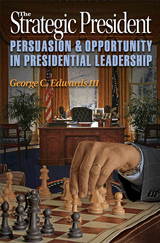Can Obama's Big Speech Really Turn Public Opinion Around?
 Deep within American political culture is the view that effective presidents solve national problems by creating opportunities for change. They identify problems, determine solutions, and, most importantly, convince the public, Congress, and others to follow their lead. Indeed, the best-known dictum regarding the American presidency is that “presidential power is the power to persuade.”
Deep within American political culture is the view that effective presidents solve national problems by creating opportunities for change. They identify problems, determine solutions, and, most importantly, convince the public, Congress, and others to follow their lead. Indeed, the best-known dictum regarding the American presidency is that “presidential power is the power to persuade.” Presidents share the view that they can convince others to follow them. Barack Obama is speaking to the nation on September 9 in an effort to revive his effort to reform health care policy in America. We should not expect a dramatic turnaround in public opinion, however. Presidents rarely move public opinion in their direction, especially when the battle lines have been drawn. Indeed, presidents, no matter how intelligent and eloquent, cannot create opportunities for change. Instead, recognizing and exploiting opportunities is the key to successful leadership.
The most celebrated period of presidential legislative success is Franklin D. Roosevelt’s Hundred Days in 1933. Yet FDR had no master plan or grand strategy for legislative success. After his inauguration, he called a special session of Congress to deal with the economic crisis. All he planned to ask from Congress was to pass legislation to regulate the resumption of banking, repeal Prohibition, and cut the budget. He expected to reassemble the legislature when permanent and more constructive legislation was ready.
Much to his surprise, however, FDR found a situation ripe for change. As shouts of “Vote! Vote!” echoed from the floor, the House debated for only forty minutes and passed the banking bill that few representatives had even seen. Roosevelt recognized his opportunity, kept Congress in session, and struck repeatedly with hastily drawn legislation to exploit this favorable environment for change.
The president did not employ his communications skills to appeal to the public to put pressure on their senators and representatives to support his proposals. Nor did he tour the country stoking backfires for his friends and against his foes; he hardy left Washington during the first hundred days. He did not have to.
Lyndon Johnson enjoyed impressive success in passing his Great Society legislation in 1965-1966. Johnson won a smashing electoral victory in 1964, and for the first and only time since the New Deal, liberals gained majorities in both houses of Congress. Johnson did not have to convince these liberals to support policies that had been on their agenda for a generation. Nor did he have to convince the public of much. His policies were popular, and the president proposed the Voting Rights Act as the civil rights movement was peaking in its ability to appeal to the nation’s conscience.
 Few people understood Congress better than the Texan, and he knew that his personal leadership could not sustain congressional support for his policies. He knew he had to exploit the opportunities provided by the assassination of President Kennedy and the election of 1964.
Few people understood Congress better than the Texan, and he knew that his personal leadership could not sustain congressional support for his policies. He knew he had to exploit the opportunities provided by the assassination of President Kennedy and the election of 1964.
And he did. He was ready to send legislation to Capitol Hill immediately after Congress convened. To keep Congress concentrated on his proposals, he was ready to replace enacted legislation with new requests. Thus, LBJ pushed as much legislation as possible through Congress to exploit the favorable political environment, keeping Congress in session until two weeks before the 1966 midterm elections.
In 1981, Ronald Reagan’s advisors recognized immediately that the unexpectedly large margin of his victory in 1980 and the equally surprising elevation of Republicans to majority status in the Senate provided a window of opportunity to effect major changes in public policy. Like FDR and LBJ, the White House knew it had to move quickly before the environment became less favorable. Thus, the president was ready with legislation, even though it was complex and hurriedly written.
The Reagan administration also knew it lacked the resources to pass a broad program. So it enforced a rigorous focus on the president’s economic plan, its priority legislation, and essentially ignored divisive social issues. By focusing its political resources on its priorities, the administration succeeded in using the budget to pass sweeping changes in taxation and defense policy.
Accurately estimating their opportunities was astute policymaking. Reagan had formidable rhetorical skills, but, contrary to legend, the public was typically unresponsive to his appeals for support. As his press secretary put it, “Reagan would go out on the stump, draw huge throngs and convert no one at all.”
Barack Obama faces enormous challenges on multiple fronts. Some criticize him for taking on too much at one time, while the White House responds that it wants to exploit the opportunities the economic crisis provides to pass sweeping changes in public policy. Because presidents cannot reshape the contours of the political landscape to pave the way for change, it is critical that they accurately recognize and assess the opportunities for change in their environments and fashion appropriate strategies and tactics to exploit them.
The Obama administration took power believing it could mobilize its core constituency and obtain majority support by employing the president’s rhetorical skills and the campaign’s high tech communications skills to sway to others to support White House initiatives. Things have not worked out that way, however. They rarely do.